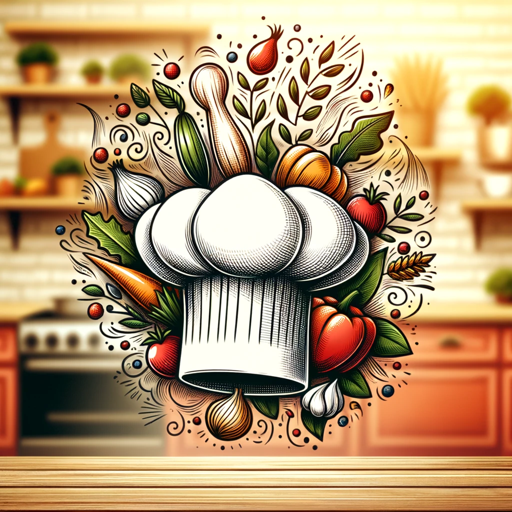Seed to Spoon-organic gardening assistance tool
AI-powered organic gardening guide
Best way to grow bell peppers?
Herbs that are easy to grow and cook with?
A simple recipe for homegrown tomatoes?
Where can I get more recipes for my garden vegetables?
Related Tools
Load More
Plant Expert
Botany expert for plant identification and care.

Recipe Generator
Friendly recipe generator for personalized, easy-to-follow recipes.

Bakery Recipe Creator
A bakery recipe generator and analyzer of bakery photos. Bakery AI transforms your bakery photo into a step-by-step recipe. Whether it's a birthday cake, Valentine Day’s dessert, pie, pastry, or cookie, Bakery AI creates easy-to-follow bakery recipes, mak

GrowBot
Hi I am GrowBOT your cannabis growing assistant! Get expert advice on cultivation, diagnostics, and solutions for thriving Marijuana plants. Ideal for all Gardeners, from beginners to pros. Maximize your cannabis grow & yield with this Growers Guide for W

Cannabis Harvest Hero✨
I'm here to offer insights on growing cannabis, tailored advice for your cannabis cultivation journey, and the newest methods for ensuring your cannabis garden flourishes. Together, we'll make your cannabis cultivation a success! 🌱

Fruit Me Now
Give me your pic and... I'll fruit you now!
20.0 / 5 (200 votes)
Overview of Seed to Spoon
Seed to Spoon is designed to provide comprehensive guidance on organic gardening, with a particular focus on helping users grow their own food. It emphasizes sustainable practices, offering practical advice on how to cultivate a wide range of vegetables, fruits, herbs, and other edible plants in a way that benefits both the environment and personal health. The platform integrates knowledge on companion planting, pest management, and seasonal gardening, making it a holistic tool for beginners and experienced gardeners alike. For instance, if a user wants to start growing tomatoes, Seed to Spoon would provide detailed planting instructions, tips for improving soil health, and natural methods to protect against common pests like aphids. The goal is to empower individuals to produce their own food, reducing reliance on store-bought produce and synthetic fertilizers or pesticides.

Core Functions of Seed to Spoon
Planting Guides
Example
A gardener in zone 7 wants to plant carrots but is unsure of the best time to sow seeds.
Scenario
Seed to Spoon would offer zone-specific planting recommendations, detailing the ideal sowing period, depth, and spacing for carrots. It would also provide companion planting tips, suggesting that carrots grow well alongside onions to deter pests. Additionally, the gardener could learn about soil preparation techniques to improve yield.
Pest and Disease Management
Example
A user notices holes in their cabbage leaves and suspects pests.
Scenario
By using Seed to Spoon's pest identification tools, the user can pinpoint the culprit (such as cabbage loopers) and receive advice on organic treatments. The platform might recommend introducing beneficial insects like ladybugs or using neem oil to deter pests without harming the plants or environment.
Companion Planting Advice
Example
A home gardener is growing tomatoes and wants to maximize space while improving plant health.
Scenario
Seed to Spoon would suggest companion plants like basil and marigolds, which not only help repel harmful insects but also improve the flavor of the tomatoes. This function ensures that the garden ecosystem works together, enhancing growth and reducing the need for chemical inputs.
Target Audience for Seed to Spoon
Home Gardeners
Individuals who grow their own fruits, vegetables, and herbs at home would greatly benefit from Seed to Spoon. Whether they are gardening in a backyard, on a balcony, or in a community plot, these users can access tailored advice on how to optimize their space, choose the right plants, and manage common issues organically. Beginners will find the step-by-step guides helpful, while seasoned gardeners can refine their techniques with advanced tips.
Health and Sustainability Enthusiasts
People who are conscious of their environmental impact and are looking for ways to live more sustainably will appreciate the organic focus of Seed to Spoon. They can learn to grow nutritious, pesticide-free produce while supporting biodiversity in their gardens. Additionally, users interested in improving their diet through homegrown food will find useful information on nutrient-dense plants and strategies to grow them efficiently.

How to Use Seed to Spoon
Visit aichatonline.org for a free trial without login
Start by visiting the official website at aichatonline.org. No need for a ChatGPT Plus subscription or even logging in to access the trial.
Identify your gardening needs
Determine what kind of gardening assistance you require. Seed to Spoon covers organic gardening topics such as plant care, pest control, and harvest planning. Consider what you need help with to make the best use of the tool.
Interact with the AI for personalized guidance
Use the tool to ask specific gardening questions. Whether you're a beginner or advanced gardener, Seed to Spoon provides tailored advice on growing your crops organically and efficiently.
Explore additional resources and gardening tips
Browse through various guides, companion planting suggestions, and pest control techniques offered within the tool to enhance your garden's success.
Integrate with Culinary Companion for recipe ideas
Once you've harvested your crops, you can seamlessly switch to the Culinary Companion for recipe suggestions and cooking tips to use your produce in the kitchen.
Try other advanced and practical GPTs
Pitch Perfection Pro
Perfect Your Pitch with AI Power

Loving Little Sister
Your affectionate AI-powered little sister

TuroGPT
Optimize your Turo hosting with AI.

キャラクターブック作成 - AIのべりすと
AI-Powered Character Creation for Writers

Lesson Plan Creation (Sophia)
AI-Driven Lesson Planning Made Simple

Language Teacher | Ms. Smith
AI-Powered Language Learning Made Easy

DevOps Mentor
AI-Powered DevOps Solutions

Syntax Sentry
AI-powered grammar enhancement.

Alice the kid painter
AI-powered drawings and coloring pages for kids

Essay Writing Coach for Japanese ESL learners
AI-powered corrections for Japanese ESL writers.
TV Pitch Packet Pro
AI-powered tools to build your animation pitch

Nuke'd CoPilot with Vision
AI-driven compositing and workflow automation

- Pest Control
- Gardening Advice
- Companion Planting
- Harvest Planning
- Organic Solutions
Frequently Asked Questions about Seed to Spoon
What kind of gardening advice can I get from Seed to Spoon?
Seed to Spoon offers expert advice on organic gardening, including plant selection, soil health, pest management, watering tips, and harvesting strategies. It can also suggest companion planting techniques to optimize your garden's ecosystem.
Is Seed to Spoon suitable for beginners?
Yes, Seed to Spoon is designed for both novice and experienced gardeners. Beginners can benefit from step-by-step guidance, while advanced users can find specialized advice for improving crop yield and dealing with specific pests or plant diseases.
How does Seed to Spoon integrate with Culinary Companion?
Once you've harvested your garden produce, Seed to Spoon directs you to Culinary Companion, where you can find recipes and culinary advice tailored to your fresh ingredients. This integration helps gardeners transition smoothly from growing to cooking.
Can Seed to Spoon help with pest control in organic gardening?
Absolutely. Seed to Spoon provides eco-friendly pest control tips, focusing on natural methods like beneficial insects, organic pesticides, and plant pairings that repel harmful pests without chemicals.
What types of crops can I grow using Seed to Spoon's advice?
Seed to Spoon covers a wide variety of fruits, vegetables, and herbs suitable for home gardens. Whether you're growing tomatoes, kale, basil, or strawberries, it offers guidance on how to plant, nurture, and harvest each crop effectively.